Caring for the Community
During Field Work Term, Stanzin Angmo ’20, Ren Barnes ’22, Ekaterina Burtseva ’20, Elene Charkviani ’22, DaEun Jung ’21, and Ulysses Lin ’20 participated in the inaugural Population Health Fellowship. This fully-paid, health-related internship opportunity was jointly offered by Bennington College and Southwestern Vermont Medical Center (SVMC).
To many, the notion of “healthcare” conjures up images of illnesses and remedial treatments. However, in the growing field of population health, this traditional view of healthcare is transformed to instead partner with people to address their social, environmental, and economic issues before they become sick.
For their 2020 Field Work Term, Stanzin Angmo ’20, Ren Barnes ’22, Ekaterina Burtseva ’20, Elene Charkviani ’22, DaEun Jung ’21, and Ulysses Lin ’20 lent their ideas, creativity, and energy to this emerging field through the inaugural Population Health Fellowship. This fully-paid, health-related internship opportunity was jointly offered by Bennington College and Southwestern Vermont Medical Center (SVMC).
Compared to me working at another hospital by myself, this Fellowship felt like more of a learning experience...Overall, I got a holistic idea of how the American healthcare system works.
Stanzin Angmo '20
Using Data to Enhance Care
At Bennington, Ulysses Lin ’20 studies Math and Computer Science. In the future, he hopes to apply his studies to design smart cities, which utilize data analysis to effectively manage their assets, resources, and services.
“When I read the job description for the Population Health Fellowship, there was a question to answer, instead of writing a cover letter: How do you want healthcare to be in the future?” said Lin. “So I figured this would be an innovative project.”
As SVMC’s Data and Information Fellow, Lin designed a person-centric dashboard, which aggregates each individual’s health, environmental, and lifestyle data.
“Currently, SVMC uses multiple systems, which are not easy to reference during their daily work,” said Lin. “They want me to help to integrate all this information into one place so they can work in one place instead of checking multiple sources.”
Having people’s data on one platform allows healthcare workers to see a holistic picture beyond the cause of one particular visit. An integrated dashboard also better positions medical workers to evaluate people’s risk-factors, anticipate future needs, and make useful recommendations.
Lin’s platform prototype was so useful that SVMC also discussed the potential of creating a similar dashboard for upper management, so department directors could more easily check in on their staff’s progress and needs.
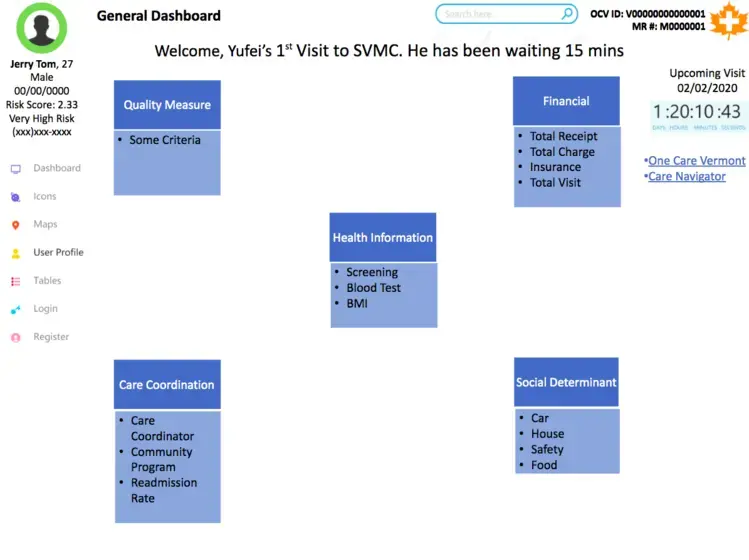
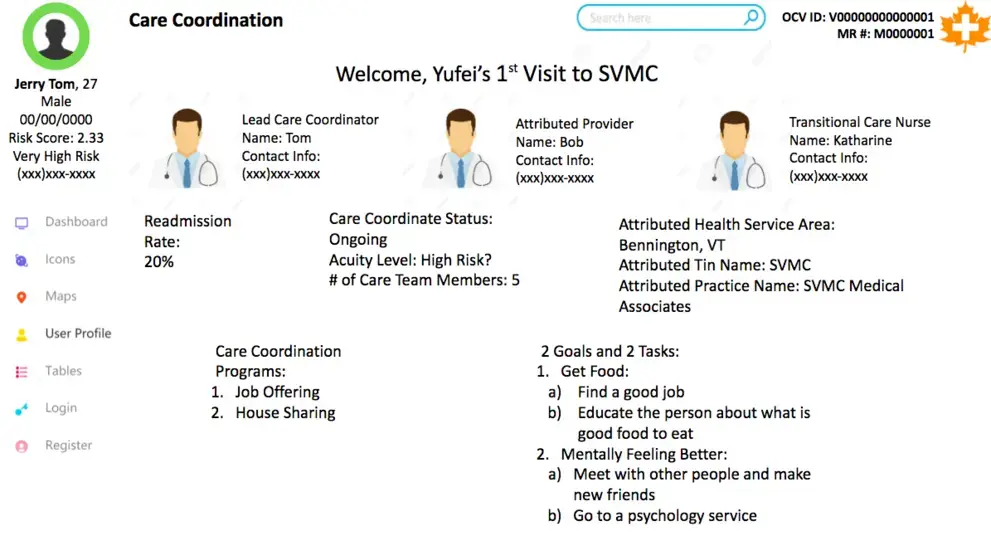
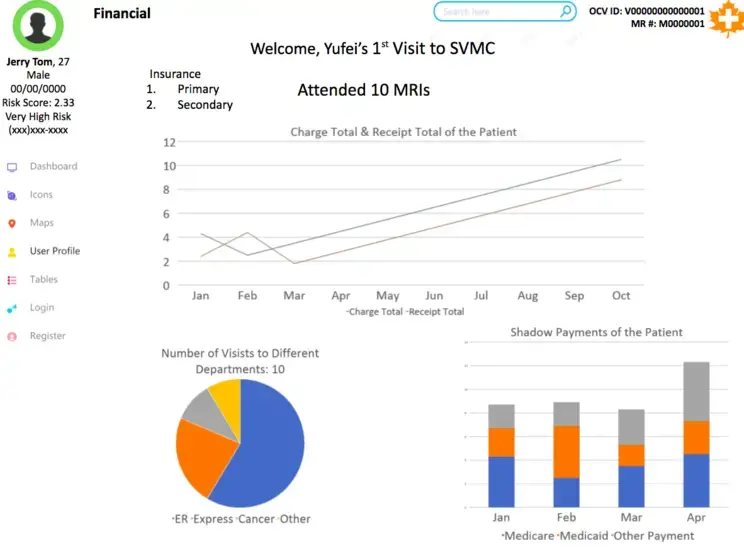
For Lin, his time at SVMC enhanced his programming experience, exposing him to new industry terminology and development processes.
“This fellowship made me think about what areas I need to consider for software development,” said Lin. “If I want to create a software, I need to think about the population it serves, and how to make it accessible to people.”
For Elene Charkviani ’22, her experience at SVMC allowed her the opportunity to grow and learn under two mentors: Director of Planning James Trimarchi and Director of Marketing and Communications Ray Smith.
“We were all matched with perfect mentors who helped us each meet our goals for this Field Work Term,” said Charkviani. “My mentors asked me, ‘What do you want to do? What resources do you need?’ From that, I got better at taking initiative and being more confident. I also made connections working with people who are professionals in the areas I’m interested in studying.”
Charkviani, who studies Economics, Math, and Spanish at Bennington, engaged in a variety of projects that collected and examined data, including a survey that addressed barriers for wellness event attendance among county residents between ages 14 and 18, and a population economics study that analyzed orthopedic data to track outpatient referrals to SVMC and its competitors.
Charkviani also gained experience running SVMC’s Instagram, where she created engaging content that encouraged people toward healthy lifestyles.
“It was interesting work. We use social media on a daily basis, so we think we know how it works, but it’s actually quite difficult to examine how to get more followers, how to revamp the Instagram page, and to assess what has to be improved,” said Charkviani.
Throughout her time at SVMC, Charkviani professionalized the account’s look, updating SVMC’s Instagram frequently with high-quality shots and Instagram stories with information about cold and flu season and COVID-19 prevention techniques.
“Overall, this Field Work Term gave me so much experience,” said Charkviani. “I learned so much about the healthcare system and how it works. Previously, I just had an outsider’s look at what happens, but now, if I continue my work in economics and finance, I have experience navigating the healthcare system. Healthcare administration or finance would be really interesting to me.”
Creating Community Connections
Having grown up in a small town in Maine, Ren Barnes ’22 understands the challenges rural communities face.
As the Transitional Care Fellow at SVMC, Barnes worked with their mentor, Bennington Blueprint for Health Director Kristi Cross, to research the social determinants of health, particularly how people’s surroundings can lead to or mitigate their risk for substance abuse disorder.
“Isolation plays a big role in opioid addiction,” said Barnes. “When people don’t have transportation, they can’t get places, whether that’s to a treatment center or to the grocery store. They’re just alone in their homes. So we hoped to educate by creating a tool that listed local transportation options.”
The pamphlet Barnes designed includes both public options and private services, and they intend to leave these brochures at SVMC and other public places for those who need them.
As she looks to her own future, Stanzin Angmo ’20 wants to pursue a career in public health. As SVMC’s Community Health Changemaker, she worked alongside RiseVT’s Program Manager Andrea Malinowski, who runs community activities that inspire health, wellness, and connectivity among participants.
“It was amazing to interact with that many people from different population groups,” said Angmo, whose previous population health experiences primarily centered around women and girls. “With RiseVT, I talked to elderly people, kids, people with special needs. We hosted Zumba and AquaFit classes and met with community members and organizations. I also helped with data tracking, so Andrea can look at those numbers and see the impact RiseVT is making in the Bennington community.”
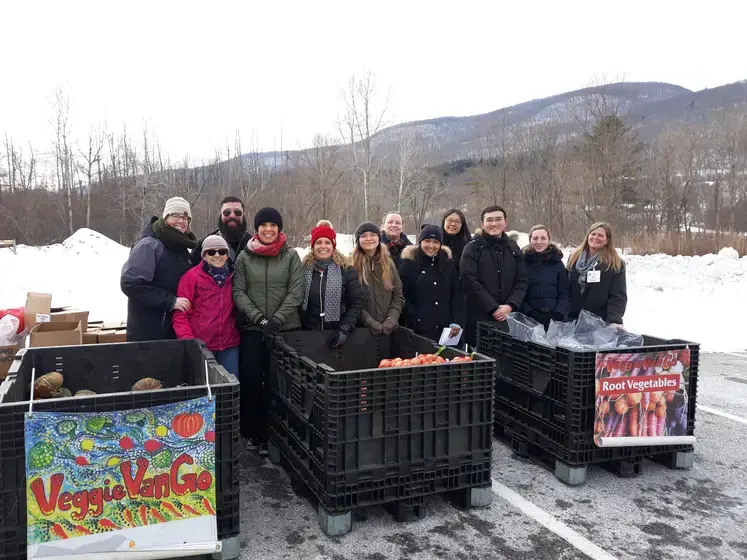

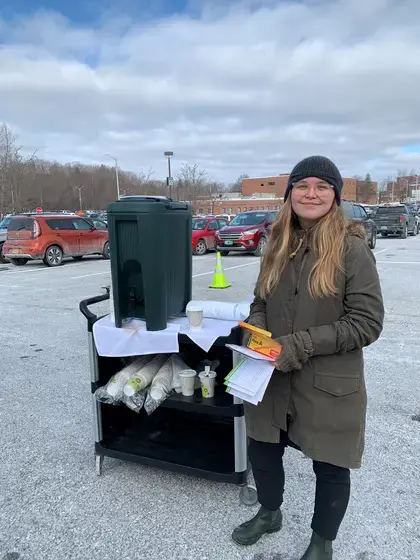
After graduation, Angmo plans on studying for her Masters in Community and Prevention Health. Her fellowship with SVMC, she said, was the “best way to start this work.”
“When I think about community health, I always focused on one population group, women, because I wanted to study the social, geographic, and economic barriers women face when seeking healthcare in the developing world,” said Angmo. “But I didn’t realize that in the US, people face similar issues. Before, I’d always focused on healthcare education and awareness, but now I see the value of activities that bring people together. Things like dance classes can make a huge difference in the community.”
Gaining New Perspectives
Even for people who have health insurance, navigating the payment and reimbursement process can be challenging.
As part of her fellowship at SVMC, DaEun Jung ’21 helped simplify both private and all-payer models of health insurance by creating a graphic breaking down the differences and steps in each.
“When hospitals provide service for the patients, each of those services are itemized—so labs, imaging, and tests each have a price tag attached that becomes a bill,” said Jung. “Generally, hospitals get reimbursed for those services by filing claims to the insurance companies, and each separate insurance company decides what services to pay for. The patients have to pay the rest.”
In an all-care model, federal and certain private insurance companies partner with Accountable Care Organizations (ACOs), such as OneCare VT, and payments are distributed from the ACOs to the affiliated hospitals in monthly installments. This streamlined payment system saves time coding and billing and allows healthcare organizations to better shape their budgets.
Jung’s explanatory graphic was recently copyrighted and will be used by SVMC.
Throughout her fellowship, Jung, who studies Psychology and wants to go into the healthcare field in the future, was struck by the teamwork and high-level of care SVMC provided.
“There were so many community partners who would form a team to work out a plan for one patient,” said Jung. “There could be twenty people from twenty different organizations who would work together to figure out what is best for the patient or their family. They would not stop until that person was connected to the right resources.”
Since she transferred to Bennington three years ago, Ekaterina Burtseva ’20 has spent her Field Work Term internships abroad, pursuing Public Action opportunities in Germany, Iran, and other places around the globe.
For her final Field Work Term, however, Burtseva looked to the College’s own local community. In connection with both SVMC’s Population Health Fellowship and the College’s Mellon Foundation-funded work to address food insecurity in Bennington County, Burtseva worked as a Wellness Warrior alongside SVMC Director of Hospitality Services Tiffany Tobin.
“This experience was eye-opening because I had always tried to leave Bennington and go somewhere else for opportunities,” said Burtseva. “When I actually stayed here and interned, my perspective of Bennington changed a lot. I had spent three years in this town without really knowing about it; what’s the point of my studying Public Action if I don’t give back to the community I’m in? This Field Work Term experience helped me fill in those gaps.”
While at SVMC, Burtseva helped develop the 802 Farmacy project, the pilot of which will serve six pre-diabetic participants and their families who are food insecure. The program will provide them with fresh produce, recipes, and educational training for six months as they learn to create nutritious food for themselves and their families—heading off health problems and developing their skills in healthy, delicious food preparation along the way.
Burtseva felt engaged in her role and integral to the program’s development.
“My mentors were very supportive and encouraging; they always made sure I was constantly involved,” said Burtseva. “I did a lot of research and grant writing—things that were interesting to me, but also useful to the project. I was impressed how open the team was to new ideas. They were very patient. If there were disagreements, people would listen to each other, try to understand and connect.”
During the development of 802 Farmacy, Burtseva also focused on long-term development—ways to collaborate with farmers, donors, and participants in order to sustain the project and its impact beyond its pilot cohort.
“Apart from being pre-diabetic, program participants are food insecure, so they come into the program without being able to access sufficient amounts of nutritious food. They are in challenging financial circumstances, so after they are done with our program, how do we help them sustain these habits?” said Burtseva. “Bennington is a small community, but I met so many passionate people working on this project who are intent on creating lasting change for their participants.”
Learning from Each Other
Though each Fellow had a different focus and role at SVMC, all agreed that the people they worked with—including SVMC staff, community members, and each other—made the program a rich experience.
“The Fellowship was very well structured. Compared to me working at another hospital by myself, this Fellowship felt like more of a learning experience than just a regular job or internship,” said Angmo. “Throughout the six weeks, we had lectures and discussions led by every supervisor. Overall, I got a holistic idea of how the American healthcare system works, which is personally beneficial because I am interested in public health. That’s a great base to have before I graduate college, so I can enter into the field of public health.”
The SVMC mentors were upfront and honest with their Fellows, which led to genuine connection and discussion among the cohort.
“I really appreciated how upfront the staff were,” said Barnes. “They were honest about the problems they were trying to fix, the state of the healthcare system in this country, and the things they wanted to improve. I admire that they didn’t coddle us.”
To other Bennington students looking to build lasting connections during their Field Work Term experiences, the Population Health Fellows urge them to look no further than their own college town.
“You don’t need to go to a big city; you can find a meaningful way to engage in the community here. My Field Work Term mentors showed me that,” said Burtseva. “They gave me life advice and talked about their experience in Bennington—they were warm, and I could see why those people chose to stay in this community. They want to stay and create change, and their attitudes are contagious. Their passion makes me feel more excited about the work I’m doing and the field I’m studying.”
By Natalie Redmond, Associate Writer